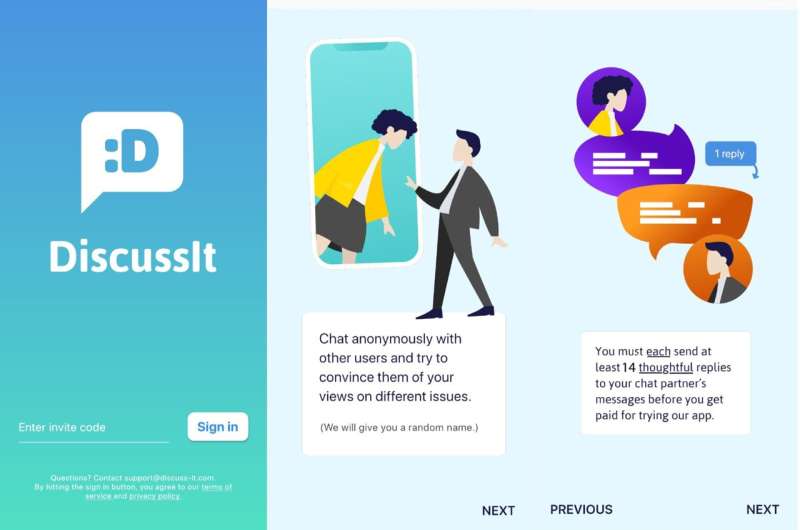This article has been reviewed according to Science X's editorial process and policies. Editors have highlighted the following attributes while ensuring the content's credibility:
fact-checked
peer-reviewed publication
trusted source
proofread
How to depolarize political toxicity on social media

While social media is often blamed for exacerbating incivility and partisan polarization, research led by Duke University scholars found that anonymous online conversations using a mobile chat platform they developed can reduce political polarization.
The research also showed how varying levels of anonymity can shape conversations about politics.
"Our results indicate that pairing two people with opposing views in an anonymous, asynchronous chat can increase the likelihood that they will find common ground," the researchers wrote. "Such settings could enable people to explore opposing arguments outside the context of peer pressure, or reduce cognitive biases related to prejudice toward opposing partisans."
The study, "Reducing Political Polarization in The United States With a Mobile Chat Platform," appeared in the Aug. 21 edition of Nature Human Behaviour. The Duke authors were Christopher Bail, Sunshine Hillygus, Alexander Volfovsky, Aldan Combs and Graham Tierney.
In recent years, COVID-19, the 2020 election, the subsequent insurrection on Jan. 6, 2021, and other controversial topics helped exacerbate the uncivil tone on social media.
The authors contend that the anonymous nature of social media conversations may enable more civilized behavior because they prevent people from pre-judging each other.
"Anonymous conversations could … reduce polarization by encouraging people to focus on the content of each other's messages instead of their partisanship," the authors said.
In the study individuals who self-identified as either Republicans or Democrats in a YouGov survey panel were invited to use a social media platform that researchers created to discuss either immigration or gun control with an opposing partisan.
After logging into the platform, the 1,201 participants were guided through several onboarding screens that told them that they are entering into a conversation with a randomly selected individual, and that they will need to exchange short messages.
After being shown a randomly assigned discussion prompt about either immigration or gun control, each participant was matched with a discussion partner from the opposing political party. Their partner's party affiliation was randomly displayed correctly, incorrectly or not at all at the time of matching. Matched pairs of Republicans and Democrats then entered the chat interface and began their conversation.
Participants were asked to have at least 14 meaningful exchanges with their partner and were periodically prompted to respond if they had been off the platform for some time and their partner was waiting for an answer.
To measure the polarization of their participants, researchers deployed two ostensibly unrelated surveys: one before they used the platform, and one several days after they completed their online conversation.
The surveys measured various notions of ideological polarization (essentially measures of individual positions on specific issues) and affective polarization (measures of negative sentiment toward the other party), which allowed a comparison of an individual's degree of polarization before and after participating in the conversations.
"Our aim was to compare individuals who had a conversation with an opposing partisan with those who did not. As such, we recruited two separate groups of individuals to act as controls. One group was asked to respond in a short, written statement to the same prompts as our chat participants, whereas another group was not given any prompts at all," according to the study.
They found that anonymous interaction in a mobile chat platform usually reduces disagreement about controversial issues and improves people's opinions of those who do not share their political views, as compared to those who do not engage in such conversations.
The researchers said more work is needed to find out whether targeted interventions that change the quality of interactions, such as suggested rephrasing and reframing of statements, can lead to a reduction in polarization.
Additionally, further study is needed to determine whether this type of peer-to-peer intervention could be implemented to prevent or de-escalate controversies on large-scale social media platforms that host very large numbers of individual participants.
More information: Aidan Combs et al, Reducing political polarization in the United States with a mobile chat platform, Nature Human Behaviour (2023). DOI: 10.1038/s41562-023-01655-0
Journal information: Nature Human Behaviour
Provided by Duke University




















